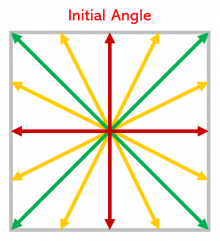Vectoring
Vectoring refers to the manner in which the player's horizontal falling speed is maximized by moving at an angle that is diagonal to the direction in which the fall was initiated.
Properties

After Mario leaves the ground, the game keeps track of the direction he was last facing while grounded. If Mario has enough momentum, he can gain extra air speed by moving in any direction that is diagonal from this initial direction (45, 135, 225 or 315 degrees apart). Vectoring is most noticeable when falling long distances, where one may be able to feel an invisible square or "box" in which Mario gains more speed at the corners. While the base angle of the fall is set when Mario leaves the ground, it can be reset in the air with a cap throw, cap bounce, or cap return spin.
Vectoring is most noticeable on the surface of the Moon Kingdom, since it is easier to vector individual jumps at a full 45-degree angle.
Vectoring can even be performed with certain captures, most notably the frog. However, it should be noted that long jumps and dives cannot be vectored.
Uses
Vectoring is used at various points in speedruns to gain a small amount of extra speed. Some notable examples of this are vectoring as the frog inside Top-Hat Tower in the Cap Kingdom, or vectoring triple jumps with momentum on the surface of the Moon Kingdom.
Vectoring is also an essential tool used for almost every trickjump. Certain trickjumps such as Bruncheon would not be possible without the use of vectoring, and many more would be much harder without it, such as Snow Dram.
